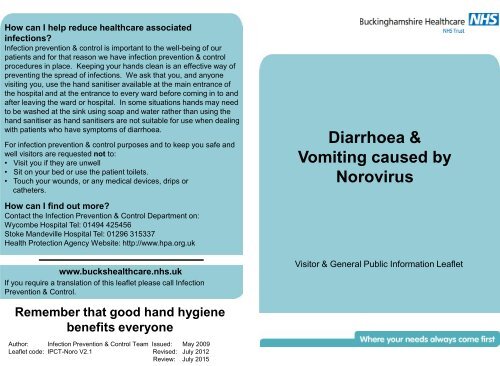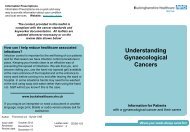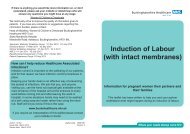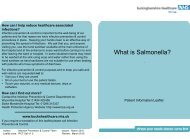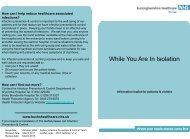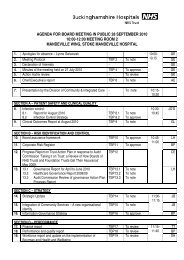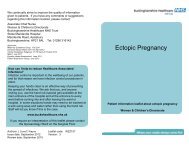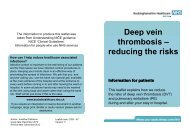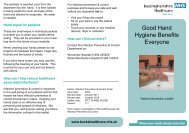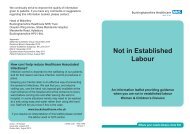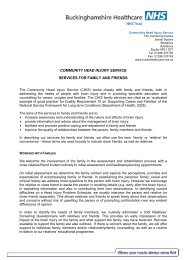Diarrhoea & Vomiting caused by Norovirus
Diarrhoea & Vomiting caused by Norovirus
Diarrhoea & Vomiting caused by Norovirus
Create successful ePaper yourself
Turn your PDF publications into a flip-book with our unique Google optimized e-Paper software.
How can I help reduce healthcare associatedinfections?Infection prevention & control is important to the well-being of ourpatients and for that reason we have infection prevention & controlprocedures in place. Keeping your hands clean is an effective way ofpreventing the spread of infections. We ask that you, and anyonevisiting you, use the hand sanitiser available at the main entrance ofthe hospital and at the entrance to every ward before coming in to andafter leaving the ward or hospital. In some situations hands may needto be washed at the sink using soap and water rather than using thehand sanitiser as hand sanitisers are not suitable for use when dealingwith patients who have symptoms of diarrhoea.For infection prevention & control purposes and to keep you safe andwell visitors are requested not to:• Visit you if they are unwell• Sit on your bed or use the patient toilets.• Touch your wounds, or any medical devices, drips orcatheters.<strong>Diarrhoea</strong> &<strong>Vomiting</strong> <strong>caused</strong> <strong>by</strong><strong>Norovirus</strong>How can I find out more?Contact the Infection Prevention & Control Department on:Wycombe Hospital Tel: 01494 425456Stoke Mandeville Hospital Tel: 01296 315337Health Protection Agency Website: http://www.hpa.org.ukwww.buckshealthcare.nhs.ukIf you require a translation of this leaflet please call InfectionPrevention & Control.Visitor & General Public Information LeafletRemember that good hand hygienebenefits everyoneAuthor: Infection Prevention & Control Team Issued: May 2009Leaflet code: IPCT-Noro V2.1 Revised: July 2012Review: July 2015
What are <strong>Norovirus</strong>es?<strong>Norovirus</strong>es are a group of viruses that are the most commoncause of gastroenteritis (stomach bugs causing diarrhoea andvomiting).Who is at risk of getting <strong>Norovirus</strong>?<strong>Norovirus</strong> can affect anyone. Staff, patients and visitors can all beaffected <strong>by</strong> <strong>Norovirus</strong> and this can be very disruptive for therunning of a hospital, as well as being very uncomfortable forwhoever is suffering from it.How is it spread?The virus is easily spread from one person to another. It can betransmitted <strong>by</strong> contact with an infected person; <strong>by</strong> eatingcontaminated food or <strong>by</strong> contact with contaminated surfaces orobjects.What are the symptoms?The symptoms will begin around 12 to 48 hours after becominginfected and will last for between 12 to 60 hours. It often startswith the sudden onset of nausea followed <strong>by</strong> vomiting and/orwatery diarrhoea. Some people may have a raised temperature,headaches and aching limbs. Most people make a full recoverywithin 1-2 days, however some people (usually the very young orelderly) may become dehydrated and require hospital treatment.Why does <strong>Norovirus</strong> often cause outbreaks?It is easily spread from one person to another and the virus is ableto survive in the environment for many days. Outbreaks usuallytend to affect people who are in environments such as hospitals,nursing homes, schools and on cruise ships.If I’m suffering from <strong>Norovirus</strong>, how can I preventothers from becoming infected?The best way of preventing spread to other people is to avoidbeing in contact with others until your symptoms have stopped forat least 48 hours. Do not visit hospital patients, relatives in nursinghomes or go to school during this time. Good hygiene is importantin preventing others from becoming infected – this includesthorough hand washing with soap and water, keeping surfacesclean and avoiding preparing food for others until you haverecovered and not had any symptoms for 48 hours.Can I visit friends/relatives in hospital?If you have symptoms of <strong>Norovirus</strong>, any tummy bug, or coughs andcolds, please DO NOT visit friends or relatives who are patients inhospital. You may well infect them or others and cause anoutbreak in the hospital.Wait until you are well and it has been 48 hours since yoursymptoms stopped before visiting.How is <strong>Norovirus</strong> treated?There is no specific treatment apart from letting the illness run itscourse. It is important to drink plenty of fluids to preventdehydration.If your symptoms haven’t improved after 3 days of illness, or if youexperience sudden worsening of symptoms or pain contact NHSDirect on 0845 46 47 or your GP for advice.2 3How are outbreaks managed?Outbreaks can be difficult to control and long-lasting becausenorovirus is easily transmitted from one person to another. Highstandards of hand hygiene <strong>by</strong> washing hands with soap and waterare very important and surfaces need to be kept clean.The most effective way to manage an outbreak is to isolate thoseinfected during their illness and for 48 hours after their symptomshave stopped. Also the number of people in the area should bekept to a minimum. This is why it is necessary to stop admissionsto affected wards in hospitals when there is an outbreak.


